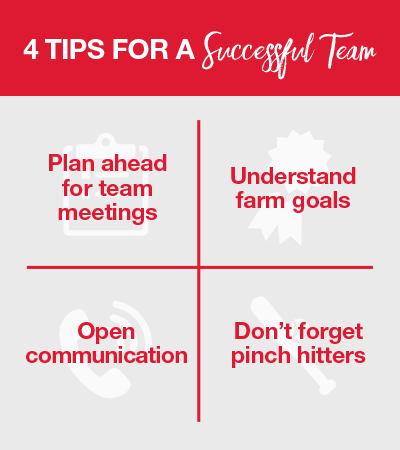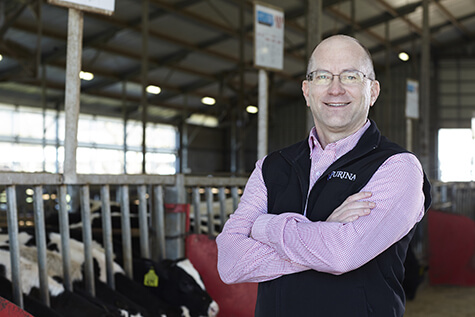
Four Tips for Leading a More Successful Team
Cow : Management
It can be challenging to keep all players, often from different companies and with different focus areas, on the same page. And let’s face it, you probably didn’t get into farming because you love employee management. But, the reward for a successful team is a shorter timeframe from identifying a challenge to finding an effective solution.
Here are four tips to help make your team of advisors more effective: Full team meetings with the key players (farm owner, dairy nutritionist, calf and heifer specialist, veterinarian and crop advisor) are often few and far between. Planning can help ensure that when these meetings happen, they are efficient and valuable for everyone.
Full team meetings with the key players (farm owner, dairy nutritionist, calf and heifer specialist, veterinarian and crop advisor) are often few and far between. Planning can help ensure that when these meetings happen, they are efficient and valuable for everyone.
Start by scheduling meetings at least 3-4 months in advance. Trying to get a large group of busy people together can take some time and calendar maneuvering. The full team should meet at least once every year.
Second, plan an agenda. Outline the key issues and discussion points upfront so everyone can come prepared. An agenda will also help focus the discussion and help you stay on track.
Finally, set expectations for yourself and your team members. What is each team member’s role in the meeting? What decisions or outcomes do you want to achieve? Being upfront about expectations makes for a smoother meeting and you’re more likely to come away with the answers you need.
For example, your calf feeding goals should be on track to develop animals that will meet your cow milk production goals when they enter the milking herd. On the crop side, knowing the milking herd goal can help balance acre efficiency goals with the dietary needs of all life stages on the farm.
Encouraging team members to talk one-on-one or in small groups can help important messages come across clearer and find more efficient solutions. Here are a few key times when team members should communicate directly:
Determine who to involve in a team meeting or small group discussion based on:
See how Purina partners with farmers across the country as part of a team.
Here are four tips to help make your team of advisors more effective:
Tip 1: Plan ahead for team meetings
 Full team meetings with the key players (farm owner, dairy nutritionist, calf and heifer specialist, veterinarian and crop advisor) are often few and far between. Planning can help ensure that when these meetings happen, they are efficient and valuable for everyone.
Full team meetings with the key players (farm owner, dairy nutritionist, calf and heifer specialist, veterinarian and crop advisor) are often few and far between. Planning can help ensure that when these meetings happen, they are efficient and valuable for everyone.Start by scheduling meetings at least 3-4 months in advance. Trying to get a large group of busy people together can take some time and calendar maneuvering. The full team should meet at least once every year.
Second, plan an agenda. Outline the key issues and discussion points upfront so everyone can come prepared. An agenda will also help focus the discussion and help you stay on track.
Finally, set expectations for yourself and your team members. What is each team member’s role in the meeting? What decisions or outcomes do you want to achieve? Being upfront about expectations makes for a smoother meeting and you’re more likely to come away with the answers you need.
Tip 2: Understand farm goals across the team
Most farm goals revolve around the milking herd. Whether it’s a specific cow milk production goal, milk components number or herd turnover rate, you and your nutritionist know these goals inside and out. But, does the rest of the team understand the goals and their role in achieving them?For example, your calf feeding goals should be on track to develop animals that will meet your cow milk production goals when they enter the milking herd. On the crop side, knowing the milking herd goal can help balance acre efficiency goals with the dietary needs of all life stages on the farm.
Tip 3: Allow for open communication
When team members don’t talk directly to each other, it can become a game of telephone with you in the middle. Messages can become lost in translation. Issues may go unresolved or even become worse.Encouraging team members to talk one-on-one or in small groups can help important messages come across clearer and find more efficient solutions. Here are a few key times when team members should communicate directly:
- Your dairy nutritionist and crop advisor should meet once a year when making primary feed purchase decisions and consult on changes or additions.
- Your veterinarian and nutritionist should meet at least quarterly, or more frequently depending on the operation size. They should also communicate whenever there’s a spike in health issues or an upcoming feed change.
- Your nutritionist and calf and heifer specialist should meet at least quarterly to discuss animal performance, forage inventories and troubleshoot issues.
- Your calf and heifer specialist and veterinarian should communicate regularly on health issues, feed changes or shifts in vaccination protocols.
Tip 4: Don’t forget about the pinch hitters
A team isn’t just made up of star players. Sometimes you need another perspective to help you make a better decision. Knowing when to bring in additional team members can help make sure the right people are sitting at the table and resolve issues quicker. Consider including your breeder, fresh cow manager, banker, milking equipment dealer, employees or other team members as needed.Determine who to involve in a team meeting or small group discussion based on:
- How quickly do you need to make a decision?
- What information do you need?
- How urgent is the issue at hand?
- Who is best equipped to advise you?
See how Purina partners with farmers across the country as part of a team.


